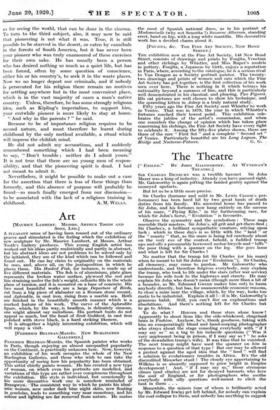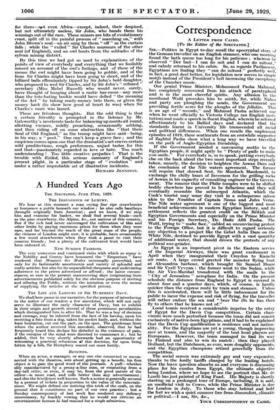The Theatre
[" EXILED." BY JOHN GALSWORTHY. AT WYNDHAM'S THEATRE.]
SIR CHARLES DENBURY was a twelfth baronet Sir John Mazer was a king of industry. Already you have guessed right. Mr. Galsworthy is again pitting the landed gentry against the moneyed upstarts.
But let us be a little more precise.
Sir Charles (humane and mild in Mr. Lewis Casson's per- formance) has been hard hit by two great hauls of death duties from his family. His ancestral home has passed to Sir John, and his fortunes now hang entirely on the success of his mare, " Flying Kite," in the forthcoming race, for which Sir John's horse, " Evolution " is favourite.
Observe the symmetry and the symbolism : These nags resemble their masters. Sir John's, all grit and get-there-first ; Sir Charles's, a brilliant sympathetic creature, relying upon luck ; which in these days is so little with the land ' or the " county " that, as the mare is being led carelessly about on the very eve of the contest, behold, a fuddled tramp ups and offs a prestimably borrowed motor-bicycle and " buffs ' the poor thing with a spanner on the leg. She goes lame and what is left for Sir Charles ?
No matter that the tramp hit Sir Charles (or his mare) when he meant to hit Sir John (or " Evolution "). Sir Charles, all clemency, may come to pardon. Mr Galsworthy who understands, and therefore forgives everybody, may explain the tramp, who took to life under the stars (after war service) because his wife took to the highways and streets. He may explain Sir John who doesn't mean (though more than a bit of a bounder, as Mr. Edmund Gwenn makes him out) to harm anybody directly, but has, for unanswerable economic reasons, .to close a mine near the village, which, by the way, looks too rustic to be industrial. Explain it all !—it is Mr. Galsworthy's generous habit. Still, you can't live on explanations and absolutions. And there's nothing left for Sir Charles but to go to Africa.
To do what ? Heaven and those stars alone know ! Apparently to shoot lions like the side-whiskered, chagrined beau in Fashion. Anyhow, he's, thank goodness, taking with him an exasperatingly bland and hand-soaping photographer who strays about the stage consoling everybody with if I may say so " as a tag to his imbecile questions (" Was it very unpleasant being in prison, if I may say so " he asks of the downfallen tramp's wife). It was time that he vanished. The next tramp might have used the spanner on him in response to a question of that type But one may be allowed a protest against the aged idea that the " land " will find a solution to evolutionary troubles in Africa. It's the old discredited Micawber stunt ! The cloudy eye appertaining tb Wilkins is so absurdly supposed to grow bright in Empire development ! And, ".if I may say so," those strenuous climes (and climbs) are not for decayed baronets who love the soul of England, or for photographers who soothe everybody with silly. _ questions well-meant to elicit the best in them . . .
Meanwhile, the miners (one of whom is brilliantly acted - by Mr. Edward Irwin) get left behind, for nobody can explain the coal collapse to them, and nobody has anything to suggest
for them—uet even Africa—except, indeed, their despised, but not ultimately useless, Sir John, who hands them his winnings out of the race. These miners are bits of evolutionary crust, split off in the painful process of " marching on," with John Brown's soul—an air sung by them " off ' as the curtain falls ; while the " exiled " Sir Charles murmurs of the other soul (of England), and an owl hoots from the solitudes of the sylvan mining district.
By this time we had got so used to explanations of the points of view of everybody and everything that we foolishly missed an account of the owl's feelings, and of those of the mouse the owl might have been going to gobble, and of the lions Sir Charles might have been going to shoot, and of the billiard balls effeminately tipped by Sir John's bold daughter, who proposed to wed Sir Charles, and by Sir John's " refaned " secretary (Miss Mabel Russell) who would never, surely, have thought of hanging about a rustic bar-room--any more than the tote-hating bookie would have defied " the meaning of the Act " by taking ready-money bets there, or given the money back (to show how good at heart he was) when Sir Charles's mare was lamed.
These are frivolous thoughts. But the odd thing is that a certain frivolity is prompted in the listener by Mr. Galsworthy's inveterate taste for balancing up merits all round, allotting excuses, mildly preaching, occasionally sobbing, and then riding off on some abstraction like " that there Soul of Old England," as the tramp might have said—being, in his way, a poet." One can't keep a grave face ; and the suspicion comes upon one that the dramatist's art craves certain wild predilections, rough preferences, unjust tastes for this and that—passionately regarded in love or hate. Too much understanding ! Too little creative prejudice ! That is the trouble with Exiled, this serious summary of England's present plight, in a particular stage of evolution and under a rather improbable set of illustrative incidents.
RICHARD JENNINGS.









































 Previous page
Previous page